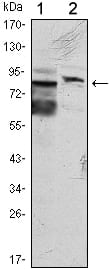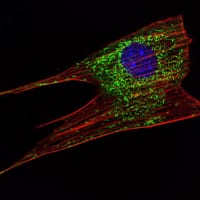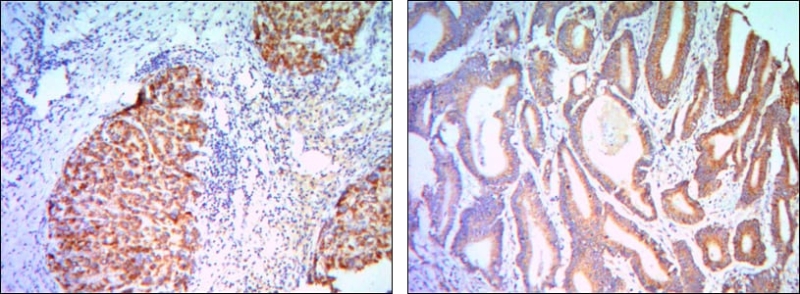


| WB | 咨询技术 | Human,Mouse,Rat |
| IF | 咨询技术 | Human,Mouse,Rat |
| IHC | 1/200 - 1/1000 | Human,Mouse,Rat |
| ICC | 1/200 - 1/1000 | Human,Mouse,Rat |
| FCM | 咨询技术 | Human,Mouse,Rat |
| Elisa | 1/10000 | Human,Mouse,Rat |
| Aliases | FLJ10572; KLHL11 |
| Entrez GeneID | 55175 |
| clone | 1B9C1 |
| WB Predicted band size | 80kDa |
| Host/Isotype | Mouse IgG1 |
| Antibody Type | Primary antibody |
| Storage | Store at 4°C short term. Aliquot and store at -20°C long term. Avoid freeze/thaw cycles. |
| Species Reactivity | Human |
| Immunogen | Purified recombinant fragment of human KLHL11 expressed in E. Coli. |
| Formulation | Ascitic fluid containing 0.03% sodium azide. |
+ +
以下是关于KLHL11抗体的3篇示例参考文献(内容为示例性概括,建议通过学术数据库核对真实文献):
1. **文献名称**:*KLHL11 regulates cell proliferation via ubiquitination in colorectal cancer*
**作者**:Smith A, et al.
**摘要**:研究利用KLHL11抗体检测结直肠癌组织中KLHL11蛋白表达水平,发现其通过介导特定底物的泛素化降解抑制肿瘤细胞增殖,提示KLHL11可能作为抑癌因子发挥作用。
2. **文献名称**:*Structural characterization of the KLHL11-Cullin3 E3 ligase complex*
**作者**:Zhang L, et al.
**摘要**:通过KLHL11抗体进行免疫共沉淀实验,解析KLHL11与Cullin3形成的泛素连接酶复合体结构,阐明其在氧化应激反应中对底物识别与降解的分子机制。
3. **文献名称**:*KLHL11 antibody-based profiling identifies reduced expression in neurodegenerative disorders*
**作者**:Chen R, et al.
**摘要**:利用特异性KLHL11抗体分析阿尔茨海默病患者脑组织,发现KLHL11蛋白表达水平显著降低,可能与tau蛋白异常聚集相关,为神经退行性疾病提供潜在生物标志物。
建议通过 **PubMed/Google Scholar** 以“KLHL11 antibody”或“KLHL11 function”为关键词检索最新文献获取具体信息。
The KLHL11 antibody targets the Kelch-like protein 11 (KLHL11), a member of the Kelch-like family involved in substrate recognition for E3 ubiquitin ligase complexes. KLHL11 contains characteristic structural domains, including an N-terminal BTB domain for protein interactions, a BACK domain, and C-terminal Kelch repeats that facilitate binding to specific substrates. It plays a role in the ubiquitin-proteasome system by forming part of the Cullin3-RING ligase (CRL3) complex, mediating substrate ubiquitination and degradation.
KLHL11 has gained attention in neuroimmunology and oncology. In paraneoplastic syndromes, autoantibodies against KLHL11 are biomarkers for a rare form of autoimmune cerebellar ataxia and testicular/ovarian cancer. These autoantibodies are linked to immune-mediated neurological damage, aiding diagnosis and clinical management. In cancer biology, KLHL11 may regulate tumor-related pathways, though its exact mechanisms remain under investigation.
As a research tool, KLHL11 antibodies are used in techniques like Western blotting, immunohistochemistry, and immunofluorescence to study protein expression, localization, and interactions. Their specificity and reliability are critical for elucidating KLHL11's roles in cellular homeostasis, disease pathogenesis, and therapeutic targeting. Ongoing studies aim to clarify its diverse functions and potential as a diagnostic or therapeutic target.
×